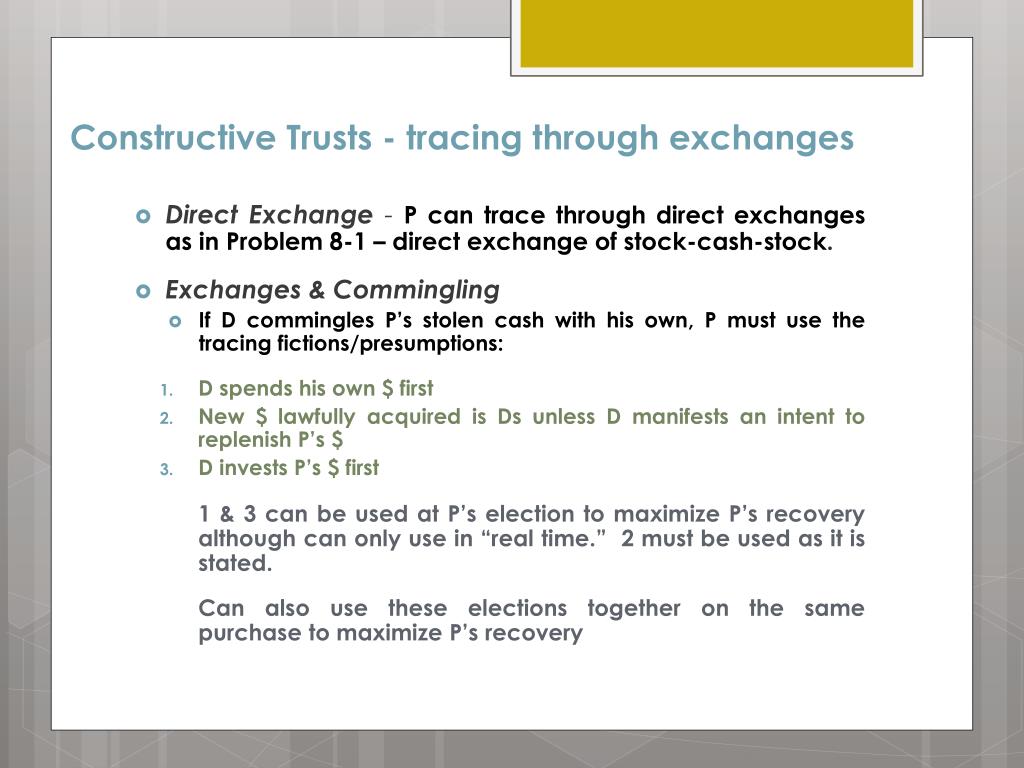Essential Information About What Is A Constructive Trust and Its Uses
Essential Information About What Is A Constructive Trust and Its Uses
Blog Article
Exploring Just How Does a Constructive Count On Work in Residential Property and Property Disputes
The idea of a useful trust fund acts as a vital mechanism within building and asset disagreements, resolving situations where one event has actually unjustly profited at the cost of an additional. This fair remedy not just looks for to correct oppressions however also stresses the value of objective and contribution in determining rightful possession. By taking a look at the subtleties of exactly how constructive trusts run, one can reveal the intricacies that often emerge in legal contexts. What ramifications do these depends on hold for future disputes, and just how might they influence the landscape of home law?

Interpretation of Constructive Depend On
A useful trust fund arises when a court figures out that it is needed to avoid unjustified enrichment, typically in scenarios where a party has actually obtained residential or commercial property with wrongful methods or under conditions that call for fair alleviation. This legal solution is not formally developed by the events involved; rather, it is enforced by the court to address circumstances where fairness and justice need intervention.
Useful trusts are frequently invoked in instances including scams, violation of fiduciary obligation, or various other types of transgression. As an example, if an individual wrongfully acquires residential property that rightfully belongs to another, the court may impose a positive trust fund to make certain that the offender holds the home for the benefit of the rightful owner. This lawful principle runs on the concept that it would certainly be inequitable for the criminal to maintain the benefits originated from their misbehavior.
Ultimately, a positive trust works as an effective tool in home conflicts, strengthening the concept that ownership should mirror not just legal title yet additionally moral considerations. By recognizing the demand for fair alleviation, courts guarantee that justice dominates in the distribution of residential property and properties.
Secret Principles of Positive Counts On
While the application of constructive trusts might vary depending upon specific scenarios, several crucial principles regularly underpin their enforcement in residential property conflicts. The principle of unfair enrichment plays an essential duty; a constructive trust is typically enforced to protect against one party from unjustly profiting at the expense of another. This principle underscores the equitable nature of useful depends on, highlighting that lawful ownership does not always correspond to rightful ownership.
Secondly, the requirement of a fiduciary relationship is considerable. What Is A Constructive Trust. Useful depends on frequently occur in contexts where one celebration has an obligation to act in the most effective rate of interests of an additional, such as in collaborations or joint endeavors. Breaches of this responsibility can cause the imposition of a positive depend protect the hurt celebration's passions
In addition, the teaching of purpose is crucial, as courts consider whether the events intended to develop a trust-like partnership, also if not formally documented. Finally, the concept of equitable remedies highlights that useful trust funds offer to supply relief that straightens with justness and justice, ensuring that the rightful complaintant can regain building or properties that they are qualified to, in spite of legal title staying in other places.
Applications in Property Conflicts
Positive counts on discover considerable application in home disagreements, particularly when attending to problems of possession and equitable legal rights. These trust funds arise in situations where one event holds home under problems that, in justness and justice, ought to profit another party. The equitable treatment of a constructive depend on protects against unjust enrichment by recognizing the payments of a Continue party who, in spite of doing not have official title, has a legitimate insurance claim to the building.
One common scenario includes cohabiting companions that add to the procurement or upkeep of building but are not on the title deed. In such cases, the courts might enforce a constructive count on to reflect the parties' payments and intents, consequently making sure that the non-titled companion obtains a reasonable share of the property.
In addition, constructive counts on can be critical in disputes involving inheritance or family residential or commercial property, where a decedent's intent may not have been formally recorded. Courts might infer a constructive depend recognize the decedent's desires and rectify potential inequities among successors. Generally, useful trusts work as an important device in harmonizing rights and ensuring equitable outcomes in residential property disputes, enhancing the principle that fairness should prevail in possession issues.
Study and Instances
Building disputes including useful trusts can often be shown through real-life study that highlight the complexities and subtleties of equitable legal rights. One significant case is * Gissing v. Gissing *, where a better half claimed a valuable rate of interest in the family home, saying that her financial contributions throughout the marriage necessitated a constructive count on. The court inevitably ruled in her support, establishing that her contributions produced a fair rate of interest regardless of the building being only in her hubby's name.
One more illustratory case is * Thompson v. Thompson *, where siblings contested the possession of a family estate after their moms and dads' passing away. One brother or sister had actually kept and enhanced the property, insisting that these activities warranted a positive depend on. The court identified the brother or sister's initiatives and discovered that a constructive count on was needed to avoid unjustified enrichment, hence awarding them a share in the estate.
These situations exemplify how constructive trusts offer to resolve scenarios where lawful possession does not reflect the true equitable my company interests of the events entailed, highlighting the value of intent and contributions in determining rightful claims in residential or commercial property disputes.
Legal Ramifications and Factors To Consider
When dealing with constructive trusts in residential or commercial property disputes,Countless lawful implications and factors to consider emerge. Foremost, the facility of a constructive count on usually pivots on the existence of an unjust enrichment, where one party benefits at the expense of another. This concept requires a thorough examination of the partnership between the celebrations and click here for more info the circumstances that brought about the alleged injustice.
In addition, courts often call for clear proof of the plaintiff's contribution to the residential or commercial property or asset concerned, which can consist of monetary investments, labor, or other kinds of support. The burden of evidence resides the claimant, demanding precise documentation and statement to validate their claims.
In addition, the timing of insurance claims is crucial, as laws of limitations might limit the ability to develop a constructive depend on after a certain duration. Legal advise should browse these time constraints meticulously to guarantee that claims are filed in a prompt manner.
Finally, the possibility for conflicts over the intent behind home transfers can make complex matters additionally, demanding a nuanced understanding of both statutory regulation and case legislation to effectively promote for a customer's passions in positive trust insurance claims.
Verdict

The concept of a useful trust offers as an essential mechanism within home and possession disagreements, addressing circumstances where one celebration has actually unjustly profited at the cost of an additional. If an individual wrongfully takes belongings of residential property that truly belongs to an additional, the court might enforce a useful trust fund to make sure that the offender holds the home for the benefit of the rightful proprietor.Useful depends on find significant application in building conflicts, particularly when dealing with issues of possession and fair civil liberties. On the whole, useful depends on serve as an important device in harmonizing civil liberties and making certain fair end results in home conflicts, enhancing the concept that justness need to prevail in ownership issues.
In summary, constructive trust funds serve as important equitable solutions in residential property and possession disputes, dealing with unjust enrichment by identifying the payments of celebrations involved. - What Is A Constructive Trust
Report this page